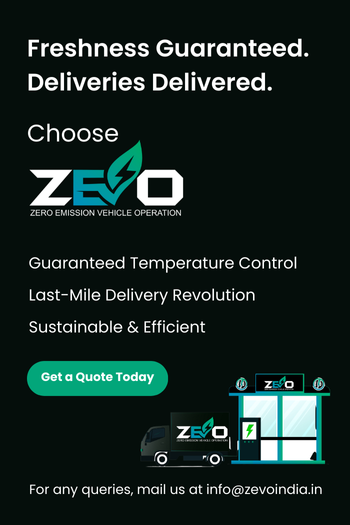Why Electric Vehicles Are a Smart Investment for Food Delivery Startups

Akshay Sharma
CEO's Office @ZEVO
Electric vehicles (EVs) are becoming an increasingly attractive option for food delivery startups in India looking to reduce costs and improve sustainability.
The long-term financial benefits of using electric vehicles for food delivery include lower fuel and maintenance costs, government incentives, improved brand image, and enhanced operational efficiency. Startups can leverage these benefits to gain a competitive edge in the market.
Lower Operating Costs
The cost of running an electric vehicle in India is approximately ₹1 to ₹1.5 per kilometer, compared to around ₹2 per kilometer for petrol two-wheelers. For example, if a food delivery startup operates 1,500 kilometres per month, the monthly fuel cost for an EV would be around ₹2,300, while a petrol bike would cost approximately ₹3,000. This stark difference can lead to significant savings, particularly for businesses with high delivery volumes.
Detailed Cost Comparison
- Electric Vehicles: The cost of operating an electric two-wheeler typically ranges from ₹0.10 to ₹0.15 per kilometer. For instance, a fully charged electric bike can cover a distance of about 100-120 kilometres, costing approximately ₹10 to ₹20 for a full charge, depending on local electricity rates. This illustrates the cost benefits of electric vehicles for food delivery services.
- Petrol Two-Wheelers: In contrast, petrol bikes generally have a running cost of around ₹2 per kilometer. With petrol prices hovering around ₹102 per Liter, a petrol two-wheeler that averages 40-50 kilometres per Liter incurs significantly higher costs over time.
Example Breakdown
- Electric Bike: If you ride an electric bike for 50,000 kilometres, the total running cost would be around ₹5,000 (₹0.10 to ₹0.15 per kilometer).
- Petrol Bike: Conversely, for the same distance, a petrol bike would cost approximately ₹1 lakh (₹2 per kilometer).
This comparison clearly demonstrates that electric two-wheelers offer a much lower cost of operation compared to petrol bikes, making them a financially smart choice for food delivery startups and individual users alike.
Incentives and Tax Benefits
The Indian government offers various incentives and tax benefits for EVs, which can further enhance their financial viability. For instance, buyers can benefit from deductions on interest payments for EV loans under Section 80EEB, potentially reducing the overall cost of ownership. This makes EV adoption even more appealing for food delivery startups aiming to optimize costs and improve margins.
Environmental and Brand Image Benefits
Adopting EVs helps in carbon emission reduction and aligns with growing consumer preferences for environmentally friendly practices. This can significantly enhance a startup’s brand image, attracting more customers who prioritize sustainability. As a result, sustainable delivery solutions in India are becoming a crucial differentiator for startups aiming to increase customer loyalty and drive sales.
ZEVO India: Providing EV Rental Solutions for Last-Mile Delivery
ZEVO India, a leading electric mobility powerhouse, offers a comprehensive ecosystem for businesses looking to adopt EVs for last-mile delivery. They provide a diverse fleet of electric vehicles, from cargo bikes to last-mile vans, that can seamlessly integrate with existing operations.
ZEVO India’s EV rental solutions eliminate the hassle of ownership, allowing startups to focus on their core business while benefiting from the advantages of EVs. Their user-friendly platform enables businesses to tailor solutions to their specific needs, ensuring a personalized experience from the start. With ZEVO India’s support, food delivery startups can enjoy seamless integration, expert guidance, and continuous support. Their real-time analytics provide valuable insights for better fleet management and operational efficiency.
Future of Food Delivery with EVs
The future of food delivery with EVs in India is promising. With the expanding EV charging infrastructure in India and advancements in electric mobility solutions, adopting EVs for delivery is becoming more feasible. Startups can benefit from cost efficiencies, government incentives, and a sustainable brand image, setting the stage for growth in the electric vehicle market.
Conclusion
In conclusion, the financial benefits of using EVs for food delivery in India are clear, with lower fuel and maintenance costs, government incentives, improved brand image, and operational efficiency. For startups looking to reduce costs and improve sustainability, EVs are a wise investment that can pay dividends in the long run. ZEVO India’s EV rental solutions make it easier than ever for businesses to adopt eco-friendly practices and achieve success in the food delivery market.

Share this Article
Subscribe to our newsletter
Be the first to receive exclusive offers and the latest news on our products and services directly in your inbox.
